Strategic Decisions: The Mathematics of Game Theory – Complete Guide to Mastering Strategic Decision Making

Game theory transforms how you approach strategic decision making by providing mathematical frameworks to analyze complex interactions and predict optimal outcomes. Whether you’re navigating business negotiations, competitive markets, or political strategies, understanding game theory principles gives you a decisive advantage. Lexa N. Palmer’s comprehensive guide demystifies complex mathematical concepts and makes strategic thinking accessible to professionals across all industries.
This expertly crafted ebook breaks down sophisticated game theory concepts into practical tools you can immediately apply to real-world scenarios. Unlike academic textbooks that focus on abstract theory, Palmer’s approach emphasizes actionable strategies that enhance your decision-making capabilities in competitive environments where every choice matters.
What You’ll Discover
- Nash Equilibrium Mastery: Learn to identify stable strategic positions where no player can benefit from changing their strategy unilaterally
- Dominant Strategy Analysis: Discover how to select optimal actions that yield superior outcomes regardless of competitors’ choices
- Information Signaling Techniques: Master the art of conveying strategic intentions while reading competitors’ signals effectively
- Behavioral Game Theory Insights: Understand how psychological factors and human behavior influence strategic interactions beyond pure rationality
- Practical Applications Framework: Apply game theory principles to economics, politics, business negotiations, and competitive market analysis
- Ethical Decision Making: Navigate complex moral considerations while maintaining strategic advantage in competitive scenarios
Why This Book Matters
Strategic decision making separates successful leaders from those who struggle in competitive environments. Palmer’s approach transforms abstract mathematical concepts into practical tools that enhance your analytical capabilities. The book addresses common objections by providing real-world examples that demonstrate immediate applicability across diverse professional contexts.
Unlike expensive MBA courses or consulting workshops, this comprehensive guide delivers university-level strategic thinking education at an accessible price point. The step-by-step methodology ensures you can implement these concepts immediately, whether you’re analyzing market competition, negotiating contracts, or developing long-term business strategies.
Key Features
This comprehensive ebook spans multiple chapters covering Nash equilibrium, dominant strategies, information signaling, and behavioral game theory applications. Available as an instant digital download, you’ll receive immediate access to practical frameworks, real-world case studies, and actionable decision-making tools. The format allows for easy reading on any device, with printable exercises for hands-on practice. Also available as audiobook on Google Play Books and Spotify for convenient listening during commutes or workouts.
Frequently Asked Questions
How does game theory improve strategic decision making in business?
Game theory provides mathematical frameworks for analyzing competitive interactions, helping you predict competitors’ moves and optimize your strategies accordingly. You’ll learn to identify Nash equilibrium positions and dominant strategies that maximize outcomes regardless of opposing actions.
Can beginners understand complex game theory concepts without mathematical background?
Palmer’s approach makes sophisticated concepts accessible through practical examples and step-by-step explanations. The book focuses on application rather than complex mathematics, ensuring professionals from any background can implement these strategic thinking tools immediately.
What makes this game theory book different from academic textbooks?
Unlike theoretical academic texts, this guide emphasizes real-world applications across economics, politics, and business. You’ll discover practical frameworks for immediate implementation rather than abstract concepts that require extensive mathematical expertise to understand and apply.
Get Your Copy Today
Transform your strategic decision making with this comprehensive guide to game theory applications. Available for instant download at just $6.99, this ebook provides exceptional value compared to expensive courses or workshops. Also available as audiobook on Google Play Books and Spotify. Purchase your copy through all major ebook retailers including Apple Books, Barnes & Noble, and Kobo to begin mastering strategic thinking today.
Watch the Video Review

